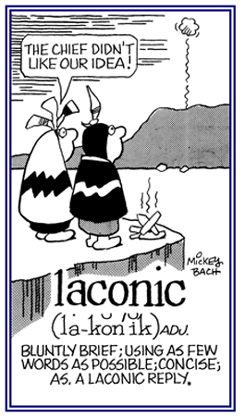Laconian
(adjective), more Laconian, most Laconian
Pertaining to Laconia: "The Laconian region was in classical Greece where Sparta was the capital."
When capitalized, referring to an ancient region of Greece: "The Laconic area that included the city of Sparta where the Spartans were known for their terse or brief and to the point speech."
laconic
(adjective), more laconic, most laconic
1. Concise, abrupt, brief, parsimonious, or of few words: When Shawn asked Betty why she didn't come to the project meeting, she gave him a
laconic answer that she wasn't feeling well.
2. A reference to the presentation of a brief style of speech: After losing the election, the politician gave his backers a
laconic explanation of what probably happened.
 © ALL rights are reserved.
© ALL rights are reserved.
 © ALL rights are reserved.
© ALL rights are reserved.
 © ALL rights are reserved.
© ALL rights are reserved.
Go to this Word A Day Revisited Index
so you can see more Mickey Bach illustrations.
laconical
(adjective), more laconical, most laconical
1. Characteristic of expressing a great deal in a few words; short, brief, concise: "Monroe's father had a reputation for his laconical responses whenever anyone asked him about his family."
laconically
(adverb), more laconically, most laconically
A reference to briefness and conciseness when expressing oneself: "Jesse laconically told his son to be back home no later than midnight after the high-school graduation party."
laconicism
(s) (noun), laconicisms
(pl)
A terseness or short and concise expressive style of saying a great deal in just a few words: "Mike's laconicism indicated his lack of interest in the topic that was presented during the meeting."
laconics
(pl) (noun) (used as a singular)
The process of using or consisting of few words; short and forceful; concise; pithy: "The laconics of the answers provided by the intelligence agent indicated that there were some confidential things that he could not reveal about the military actions."
laconicum
(s) (noun), laconica
(pl)
The sweating-room or vapor bath, so called from having been first used by the Laconians or Spartans: "The laconicum was heated by artificially warmed air for sweating when taking the Roman baths."
laconism
(s) (noun), laconisms
(pl)
A brief way of expressing oneself.
laconize
(verb), laconizes; laconized, laconizing
1. To imitate the Lacedaemonians in dress, manners, etc.
2. To imitate the manner of the Laconians; especially, in brief, pithy speech, or in frugality and austerity.
Laconophile
(s) (noun), Laconophiles
(pl)
Anyone who has a love or fondness for Lacedaemon, or Sparta, in Laconia, and its culture and laws;
Laconophiles admire the Spartans, praise their valor in war, their military successes, their aristocratic and virtuous ways, the stable order of their politcal life, and their constitution, with its tripartite mixed government.
The term, "tripartite" refers to a form of government which integrated aspects of democracy, oligarchy, and monarchy.
The historical background for the terms laconic, laconism, etc.
The Greek term for an inhabitant of the ancient region of Laconia, in the southern Peloponese, and of its capital Sparta, was Lakon. The Spartans were renowned for not using two words when one would do. There is a story that when Philip of Macedon threatened an invasion of Sparta, he said: "If I enter Laconia, I will raze Sparta to the ground." The Spartans' only reply was "If".
The Lacadaemonians were all supposed to be so parsimonious with words, and were noted in the ancient world not only for their stoic Spartan lifestyle; but also for their short, brusque, and pithy way of speaking and writing, which was appropriate for their outward lack of emotion.
Not only in Sparta, the capital, but throughout the country youths were taught modesty and conciseness of speech; in fact, they were taught so well that the word laconic comes to us by way of Latin from the Greek Lakonikos, meaning "like a Laconian". So, now a laconic person is generally one who expresses a great deal without wasting words, who is terse, to the point, and usually undemonstrative.
—Encyclopedia of Word and Phrase Origins by Robert Hendrickson;
Facts on File, Inc.; New York; 1997; page 394.
Just as the study of the classics has disappeared from so many educational curricula, so has the understanding that some terms; such as, laconic once had.
Laconic came to us via Latin from Greek Lakonikos, and was first recorded in 1583 with the meaning "of or relating to Laconia or its inhabitants".
Lakonikos is derived from Lakon, "a Laconian, a person from Lakedaimon", the name for the region of Greece of which Sparta was the capital.
The Spartans, noted for being warlike and disciplined, were also known for the brevity and conciseness of their speech, and it is this quality that English writers denote by the use of the adjective laconic, which is believed to be used first in this sense in 1589.
—The American Heritage Dictionary of the English Language, third edition;
Houghton Mifflin Company; Boston; 1996.



